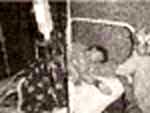A lesson from malaria
 Even as the cerebral malaria epidemic in Rajasthan abates with the onset of winter, NGOs who had first sounded the alarm are trying to ensure that the incident does not slip from the state government's memory, till the next outbreak. The Rajasthan Voluntary Health Association (RVHA), with support from the state's other NGOs, is filing a public interest litigation in the Supreme Court demanding compensation for those killed by the disease.
Even as the cerebral malaria epidemic in Rajasthan abates with the onset of winter, NGOs who had first sounded the alarm are trying to ensure that the incident does not slip from the state government's memory, till the next outbreak. The Rajasthan Voluntary Health Association (RVHA), with support from the state's other NGOs, is filing a public interest litigation in the Supreme Court demanding compensation for those killed by the disease.
The epidemic, which followed a heavy monsoon, ravaged the districts of Barmer, Jodhpur, Bikaner and Jaisalmer. Its spread has been attributed to the Indira Gandhi Canal which runs through the Jaisalmer and Bikaner districts, and the indifference of the health authorities, who allowed the disease to spread unchecked. The NGOs claim to have verified that the disease killed 1,000 people.
"Since negligence by state health authorities was responsible for the epidemic, we are going to demand recompense from them for the families of the victims," says Sanjoy Ghose of the Uttari Rajasthan Milk Union Limited Trust, a voluntary organisation based in Barmer district. The case will be filed by Soli Sorabjee on behalf of the RVHA in the first week of December.
"It will set a precedent that will help to ensure greater public health accountability of all state governments," says Ghose.
Related Content
- Climate services for health: improving public health decision-making in a new climate
- Delhi tops the country in fatal road accidents and in number of pedestrians and cyclists falling victim, says new CSE assessment
- Lessons from agriculture for the sustainable management of malaria vectors
- Encephalitis returns to haunt Assam
- Courting lung cancer
- HIGHLIGHTS
